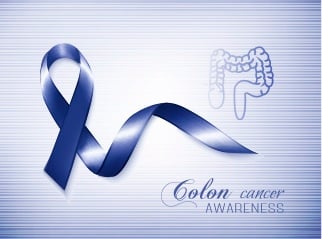 March is Colorectal Cancer Awareness Month. “Colorectal cancer” is a general term used to describe cancers that begin in the colon or rectum. The American Cancer Society estimates that 39,910 new cases of rectal cancer and 95,520 new cases of colon cancer will be diagnosed in the U.S. this year, affecting 1 in 21 men and 1 in 23 women and claiming 50,260 lives. Colorectal cancer currently is the third-leading cancer-related cause of death in women and the second-leading cause in men in the U.S.[1]
March is Colorectal Cancer Awareness Month. “Colorectal cancer” is a general term used to describe cancers that begin in the colon or rectum. The American Cancer Society estimates that 39,910 new cases of rectal cancer and 95,520 new cases of colon cancer will be diagnosed in the U.S. this year, affecting 1 in 21 men and 1 in 23 women and claiming 50,260 lives. Colorectal cancer currently is the third-leading cancer-related cause of death in women and the second-leading cause in men in the U.S.[1]
Why is colorectal cancer screening important?
The mortality rate from colorectal cancer has been falling for several decades, and many researchers attribute this trend to increased screening, which allows doctors to detect and remove many polyps before they develop into cancer.[2] A polyp can take 10–15 years to develop into cancer, making regular screening a highly effective way to catch developing cancers early. When they are caught early—before they spread beyond their place of origin—about 90% of patients survive for five or more years beyond diagnosis.[3]
Unfortunately, however, only slightly more than half of people get colorectal screening as recommended.[4] The American Cancer Society advises annual screening beginning at age 50 for those at average risk. Those at increased risk, such as people with a family history of colorectal polyps or cancer or a personal history of inflammatory bowel disease, should consult with their doctors to determine the best screening schedule and method for their needs.[5]
What types of colorectal cancer screening are available?
The American Cancer Society provides a list of appropriate screening tests to protect yourself against colorectal cancer. Some of these are aimed primarily at finding cancer and others are also targeted at finding precancerous polyps, allowing patients to go longer in between screenings. Below are the types of screening approved by the ACS and how frequently they should be repeated:
Every 10 years
- Colonoscopy
Every 5 years
- Flexible sigmoidoscopy
- Double-contrast barium enema
- CT colonography (also known as virtual colonoscopy)
Every 3 years
- Stool DNA test
Annually
- Guaiac-based fecal occult blood test
- Fecal immunochemical test
What is a virtual colonoscopy?
CT colonography, more commonly known as virtual colonoscopy, is a less invasive alternative to traditional colonoscopy screening. Following a bowel cleansing regimen, air is gently pumped into the colon via a very small, flexible tube, making it possible to create a CT scan of the rectum, the colon, and its lining, that the radiologist can then examine for signs of polyps and disease. Using CT colonography, the radiologist can also sometimes identify abnormalities, such as cancers or aneurysms, that are located outside the colon. The entire exam takes only about 15 minutes to perform. Unlike traditional colonoscopy, CT colonography doesn’t require sedation, and patients can immediately resume their regular activities immediately following the exam. If polyps are found, then a traditional colonoscopy will be performed to remove them.
What are the symptoms of colorectal cancer?
Because symptoms often do not appear with the onset of cancer, regular screening is important. If you notice the following symptoms between screenings, consult your doctor.[6]
- Diarrhea or constipation lasting more than four weeks
- Unexplained weight loss
- Bloody stools
- Persistent abdominal pain or discomfort
- The feeling that your bowel never empties
- Persistent fatigue
Iowa Radiology offers CT colonography at our Downtown Des Moines clinic. Feel free to contact us for more information or to schedule an appointment. For more information on CT exams, click the button below.
Some—but not all—insurers cover virtual colonoscopy. We offer a 20% discount for those without insurance coverage for this procedure who pay in full at the time of service.
The information contained in the Iowa Radiology website is presented as public service information only. It is not intended to be nor is it a substitute for professional medical advice. You should always seek the advice of your physician or other qualified healthcare provider if you think you may have a medical problem before starting any new treatment, or if you have any questions regarding your medical condition.
Iowa Radiology occasionally supplies links to other web sites as a service to its readers and is not in any way responsible for information provided by other organizations.
[1] “Key Statistics for Colorectal Cancer.” Cancer.org. American Cancer Society, 5 Jan 2017. Web. 2 Feb 2017.
[2] "Colorectal Cancer Facts & Figures 2014–2016.” Cancer.org. American Cancer Society, 2014. Web. 2 Feb 2017.
[3] “The Importance of Colorectal Cancer Screening.” Cancer.org. American Cancer Society, 24 June 2016. Web. 2 Feb 2017.
[4] Ibid.
[5] “Can Colorectal Cancer Be Prevented?” Cancer.org. American Cancer Society, 24 June 2016. Web. 2 Feb 2017.
[6] "Colon Cancer." MayoClinic.org. Mayo Foundation for Medical Education and Research, n.d. Web. 2 Feb 2017.


